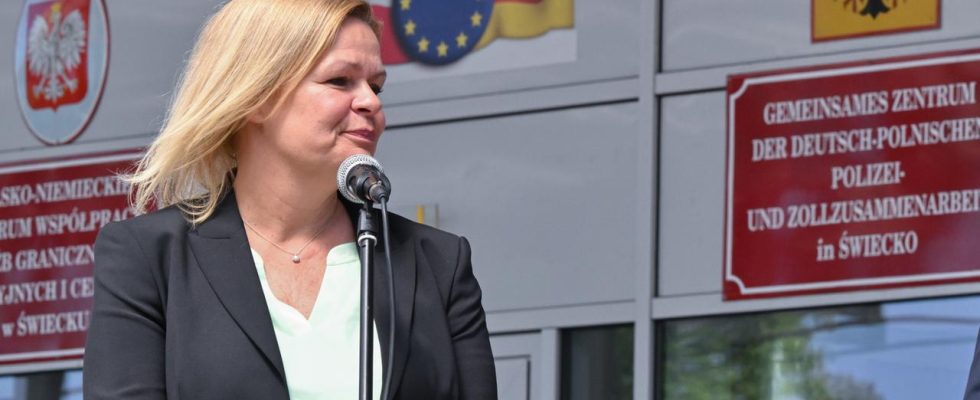Federal Interior Minister Faeser is sticking to her no to stationary controls at the German-Polish border. But she wants to send more federal police officers there. That’s not enough for the mayor of the border town of Guben.
Cars with German and Polish license plates roll over the city bridge, pedestrians stroll from one bank to the other. Guben and Gubin are twin towns on both sides of the Neisse, separated after the border was drawn as a result of the Second World War. Only a German border post on one side of the river and a Polish one on the other side of the river remind you that you are moving from one country to another.
There have been no border controls here for more than 15 years, since Poland joined the Schengen Agreement in 2007. About 1,000 Poles and Germans commute back and forth here every day to work, shop or study, says Guben’s Mayor Fred Mahro, leaning on the railing and looking over the bridge.
Mayor for stationary border controls
But the fact that groups of ten or twenty people are appearing in the city more and more frequently, presumably refugees, who are then picked up by the federal police, worries the CDU politician. On the one hand, their number has been steadily increasing since the beginning of spring, and on the other hand, he wants to avoid giving the impression that something could get out of hand here. That would unsettle the locals and stir up fears.
That is why Mahro is also in favor of introducing stationary border controls here temporarily, as in Bavaria. This would also give the federal police the opportunity to turn people away who try to enter the country irregularly. For him, this is definitely a measure to show people that politicians take the situation seriously. The mayor was also “extremely disappointed” these days when the Federal Minister of the Interior repeatedly spoke out against the introduction of stationary controls at the German-Polish border. He would like to invite the minister to Guben so that she can take a look at the situation on site.
Guben’s mayor Mahro is in favor of introducing stationary border controls.
More federal police officers instead of stationary controls
Now Nancy Faeser has gone to the German-Polish border, but not to Guben, but to Swiecko in Poland, a few kilometers south of Frankfurt/Oder. The center of German-Polish police and customs cooperation is located here on the site of a former border crossing on the A12 motorway. From here, the fight against border crime has been coordinated for more than 15 years, information has been exchanged, joint search measures and hinterland controls carried out. This also includes action against illegal migration.
Even after her visit here, the SPD politician is sticking to her no to stationary border controls. Faeser referred to the example of the Czech Republic. There they managed to reduce the very high migration numbers by strengthening the forces and the veil search. This is also planned on the German-Polish border.
The Federal Minister of the Interior spoke of additional “several hundreds” of the federal police. There are such close relationships in everyday life that they would be “massively disturbed” by stationary border controls, explained Faeser. At the border with Austria, where such controls have been carried out for years, the situation is completely different.
“The situation is dramatic”
There were almost 1,000 cases of “apprehension” of illegal migrants on the German-Polish border in April, said Brandenburg’s Secretary of State for the Interior, Markus Grünewald, after the conversation with Faeser. This trend also continued in May. In February there were 200 and in March 500 cases.
The situation on the German-Polish border is dramatic and for him the conditions are met to introduce border controls, as formulated at the prime ministers’ conference in early May. In all Brandenburg districts and urban districts, the situation is such that the arriving people can no longer be accommodated appropriately. This is an unsatisfactory situation, according to Grünewald.
Guben’s Mayor Mahro also shares the concerns about the accommodation of refugees, which is why he is in favor of more controls, temporarily, until the situation has defused again.
Bartłomiej Bartczak is standing next to Mahro on the city bridge. He is the mayor of Gubin, non-party, did his Abitur on the German side and studied at the Viadrina University in Frankfurt/Oder. He appreciates the close proximity of the two cities. In the current situation, more police presence and selective controls certainly do no harm, but permanent controls and even closing the borders are harmful to the economy and to coexistence in Guben and Gubin.

